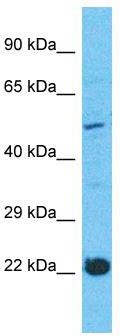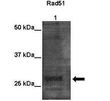RAD51 Rabbit Polyclonal Antibody
USD 200.00
USD 867.00
USD 436.00
Specifications
| Product Data | |
| Applications | IHC, WB |
| Recommended Dilution | WB, IHC |
| Reactivities | Mouse, Human |
| Host | Rabbit |
| Isotype | IgG |
| Clonality | Polyclonal |
| Immunogen | The immunogen for Anti-RAD51 Antibody: synthetic peptide directed towards the N terminal of human RAD51. Synthetic peptide located within the following region: ANDVKKLEEAGFHTVEAVAYAPKKELINIKGISEAKADKILVMAERYGLS |
| Formulation | Liquid. Purified antibody supplied in 1x PBS buffer with 0.09% (w/v) sodium azide and 2% sucrose. Note that this product is shipped as lyophilized powder to China customers. |
| Purification | Affinity Purified |
| Conjugation | Unconjugated |
| Storage | Store at -20°C as received. |
| Stability | Stable for 12 months from date of receipt. |
| Predicted Protein Size | 26 kDa |
| Gene Name | RAD51 recombinase |
| Database Link | |
| Background | RAD51 is a member of the RAD51 protein family. RAD51 family members are highly similar to bacterial RecA and Saccharomyces cerevisiae Rad51, and are known to be involved in the homologous recombination and repair of DNA. This protein can interact with the ssDNA-binding protein RPA and RAD52, and it is thought to play roles in homologous pairing and strand transfer of DNA. This protein is also found to interact with BRCA1 and BRCA2, which may be important for the cellular response to DNA damage. BRCA2 is shown to regulate both the intracellular localization and DNA-binding ability of this protein. Loss of these controls following BRCA2 inactivation may be a key event leading to genomic instability and tumorigenesis. Two alternatively spliced transcript variants of this gene, which encode distinct proteins, have been reported. Transcript variants utilizing alternative polyA signals exist.The protein encoded by this gene is a member of the RAD51 protein family. RAD51 family members are highly similar to bacterial RecA and Saccharomyces cerevisiae Rad51, and are known to be involved in the homologous recombination and repair of DNA. This protein can interact with the ssDNA-binding protein RPA and RAD52, and it is thought to play roles in homologous pairing and strand transfer of DNA. This protein is also found to interact with BRCA1 and BRCA2, which may be important for the cellular response to DNA damage. BRCA2 is shown to regulate both the intracellular localization and DNA-binding ability of this protein. Loss of these controls following BRCA2 inactivation may be a key event leading to genomic instability and tumorigenesis. Two alternatively spliced transcript variants of this gene, which encode distinct proteins, have been reported. Transcript variants utilizing alternative polyA signals exist. |
| Synonyms | BRCC5; FANCR; HRAD51; HsRad51; HsT16930; MRMV2; RAD51A; RECA |
| Note | Immunogen sequence homology: Pig: 100%; Rat: 100%; Horse: 100%; Human: 100%; Mouse: 100%; Bovine: 100%; Rabbit: 100%; Guinea pig: 100%; Dog: 93%; Zebrafish: 93%; Yeast: 79%; Goat: 77% |
| Reference Data | |
| Protein Families | Druggable Genome, Stem cell - Pluripotency, Transcription Factors |
| Protein Pathways | Homologous recombination, Pancreatic cancer, Pathways in cancer |
Documents
| Product Manuals |
| FAQs |
| SDS |
{0} Product Review(s)
Be the first one to submit a review






























































































































































































































































 Germany
Germany
 Japan
Japan
 United Kingdom
United Kingdom
 China
China





